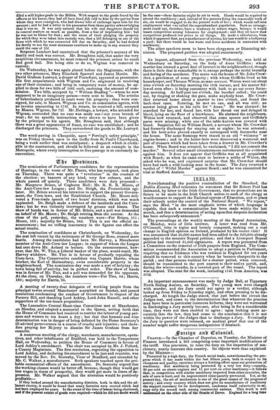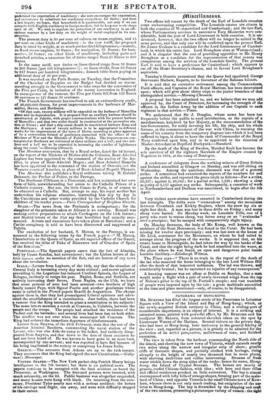Soreign an Q;olortial.
FRANCE.—In the Chamber of Deputies, on Tuesday, the Minister of Finance introduced a bill comprising some important modifications of the tariff. One provision, to raise the duty on the importation of ma- chinery, nearly interests this country. Its objects were thus explained by the Minister— Protected by a high duty, the French metal trade, notwithstanding the pro- gress which it has made within the last fifteen years, both in respect to its cheapness and quality, exercises always a limiting effect upon our production of machinery. But machinery being protected by a very low duty—namely, 30 per cent on steam-engines and 15 per cent on other machinery—it follows that, in competition with similar machinery imported from other countries, the sale of ours is hurt, and its improvement consequently prevented. Yet, at the present day, the art of mechanism is one of, the great causes of the progress of society ; and every country which does not give its manufacture of machinery the support necessary for its development, condemns itself voluntarily to oc- cupy only the second rank among commercial nations. This truth is well understood on the other side of the Straits of Dover. England for a long time
prohibited the exportation of machinery : she now encourages the exportation, and endeavours to substitute her machinery everywhere for theirs ; and from
a late inquiry we learn, that henceforth it is questionable, not only if we can compete with English machinery in foreign markets, but to keep our work-shops open at all. We wish to regulate the protection of our machinery. in an effi- cacious manner by a low duty on the weight of metal employed in its con- struction.
The present duty is 30 per cent ad valorem on steam-engines, and 15 per cent on other kinds of machinery : in the new tariff, the proposed
duty is rated by weight, at so much per hundred kilogrammes,—namely, on fixed steam-engines, 30 francs ; for navigation, 35 francs; for loco- motion, 56 francs ; on other kinds of machinery, including parts and detached articles, a numerous list of duties ranges from 25 francs to 200 francs.
In the same tariff, new duties on linen-thread range from 38 francs to 205 francs [per 100 kilogrammes ?] ; on linen-cloths, from 60 francs to 817 francs per hundred kilogrammes ; damask table-linen paying an additional duty of 20 per cent. It was reported on the Paris Bourse, on Tuesday, that the Committee of the Chamber of Deputies on the Budget had decided on recom- mending strongly to the Government to take steps for the conversion of the Five per Cents, in imitation of the recent conversion in England. in consequence of the rumour, the Five per Cents fell from 122 francs 30 centimes to 121 francs 30 centimes.
The French Government has resolved to ask an extraordinary credit, of 46,000,000 francs, for great improvements in the harbours of Mar- seilles, Havre, and Bordeaux.
" Of that sum, twenty millions will be expended on the harbour of Marseilles Vane and its dependencies. It is proposed that an auxiliary harbour should be
constructed at Jahette, with proper communications with the present harbour
of Marseilles; and that two moles should be constructed at the preventive sta- tion at Frione ; and that a ship-canal should be constructed between Bone and
the Martigues. A sum of twenty millions is to be appropriated to different
works for the improvement of the town of Havre, according to plans approved of by a commission formed of gentlemen connected with the offices of the Minister of War and the Minister of Public Works. The improvements con- templated at Bordeaux are estimated at three millions and a half; and two mil- lions and a half are to be expended in increasing the number of lighthouses along the coast."—Morning Chronicle.
The Moniteur announces, that by a Royal order, dated the 3d instant, on the report of the Minister of Marine and the Colonies, Rear-Admiral Laplace has been appointed to the command of the station of the An- tilles, in place of Rear-Admiral Moges ; and Rear .Admiral Hamelin has been appointed to the command of the station of Oceania and the Western coasts of America, in place of Rear-Admiral Dupetit Thouars. The Moniteur also publishes a Royal ordinance raising M. Gabriel Delessert, the Prefect of Police, to the Peerage.
The Duchesse d'Orleans is a Protestant, and has maintained her own form of faith, notwithstanding her union to the Catholic Prince of a `Catholic country. Her son, the little Comte de Paris, is of course to be educated as a Catholic. But, strange to say, his royal mother has undertaken his religious education, instructing him day by day in The Catechisms and other works provided by the Catholic Church for Children of his tender years.—Paris Correspondent of Brighton Gazette. Sreala.—The news from the Peninsula is unimportant ; for the slaughter of the prisoners taken at Alicant is no novelty. Roncali was making active preparations to attack Carthagena on the 15th instant ; and Madrid letters of the 21st say that hostilities had actually com- menced. Arrests and executions have taken place at Barcelona ; and a Carlist conspiracy is said to have been discovered and suppressed at Tafal la.
The exaltation of her husband, S. Munoz, to the Peerage, is an- nounced iu the following terms by the French papers—" M. Munoz,
Chamberlain to the Queen of Spain, an old superior officer of the Guard, has received the titles of Duke of Rianzares and of Grandee of Spain of the first class."
PORTUGAL.—The Spanish papers assert that the fort of Almeida, held by Count Bomfim, had surrendered ; but the Lisbon letters of the iosl.ul make no mention of the fact, and are barren of any news about the revolution.
!Tam—Letters from Leghorn, of the 16th, say that the situation of Central Italy is becoming every day more critical ; and secret agitation prevailing in the Legations has induced Cardinal Spinola, the Legate of Bologna, suddenly to resign his post. Naples, Rome, and Sardinia, are Mrtively increasing their forces. From Naples, on the 17th, we learn
=that some persons of note had been arrested—two brothers of high 'family named Pepe, with Signor Poerio and another gentleman whose name is called in the French papers Bozelli de Augustines. The charge against them is, that they had promulgated Liberal opinions and advo- cated the establishment of a constitution. Just before, there had been a rumour that the King intended to grant a constitution to his subjects ! The same letters mention a revolt at Cozenza, in Calabria, between the people and the troops. The people bad attacked the residence of the Prefect and the barracks; and several lives had been lost on both sides. The conflict was not over when the messenger left Cozenza. The 'King had ordered the immediate departure of reinforcements. Letters from Smyrna, of the 29th February, state that the son of the Austrian Admiral Bandiera, commanding the naval station of the Levant, who was also Aide-de-camp to his father, had suddenly disap- peared from Smyrna, and that down to the date of those accounts he had not been heard of. He was known to have gone in an open boat, accompanied by one servant ; and was reported to have fled because of his being implicated in the society or conspiracy La Jeune Italie.
GREECE.—The accounts from Athens are up to the 12th instant. They announce that the King had signed the new Constitution.—Galig- Mani S MeRSeNger.
UNITED STATES—Me New York packet-ship Patrick Henry brings Intelligence to the 7th instant; but there is no political news. The ;papers continue to be occupied with the fatal accident on board the 'Princeton, at Washington. The deceased persons were interred, with much solemnity, on the 2d. Public business was altogether suspended, and many houses were hung with black. On returning from the cere- mony, President Tyler nearly met with a serious accident: the horses alas carriage took fright, ran away, and were with difficulty stopped ba their career.



























 Previous page
Previous page